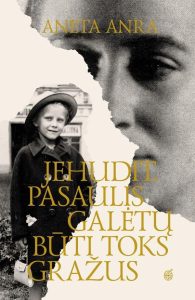ANETA ANRA. JEHUDIT. THE WORLD COULD BE SO BEAUTIFUL

HISTORY AND BIOGRAPHY
Aneta Anra, Jehudit. The World Could Be So Beautiful (Jehudit. Pasaulis galėtų būti toks gražus), Vilnius: Odilė, 2021, 240 pp. French and Polish sample translations available
The book’s heroes, interviewed by Aneta Anra, recounting their memories and guiding us through them, take us to the most catastrophic period in the 20th century – World War II, which unfolds through the memories of Jehudit, named Dita in the book, who was the wife of the Juda-Julius Zupavičius, the head of the Kaunas Jewish Ghetto police (the world’s only police force that carried out underground activities), that she had kept hidden for the entirety of her almost one-hundred-year long life in order to survive and live. The self-preservation mode of Dita’s narrative, that retained the purity of her experiences, serves as a vector of memory retention in the story of the other protagonist Hana, the Polish woman: how the war was witnessed and experienced by a Polish military officer’s eight-year-old daughter, who stayed in Vilnius during the war, and not in Warsaw, which was being bombarded by the Nazis; how courageous her mother Janina was in helping Jews to hide; and how the Vilnius of the period looked when it was regained from Poland – not for Lithuania but for war and hardship instead. “Women in the Vortex of Life” – such should be the title of the book, according to Dita, that is about her, Hana, and Hana’s mother.
Aneta Anra – a writer and a playwright. Her plays “Bestija žydrom akim” (Blue-Eyed Beast) and “Katinas Temzėje” (A Cat in the Thames) have been shown at the State Youth Theater. Anra has published books such as “Niki: dvigubas portretas” (Niki: A Dual Portrait), “Paleistuvės, arba Meilė pagal Niurnbergo mergelę” (Prostitutes, or Love According to the Maiden of Nuremberg), in which the author’s autobiographical fragments are woven into fiction.